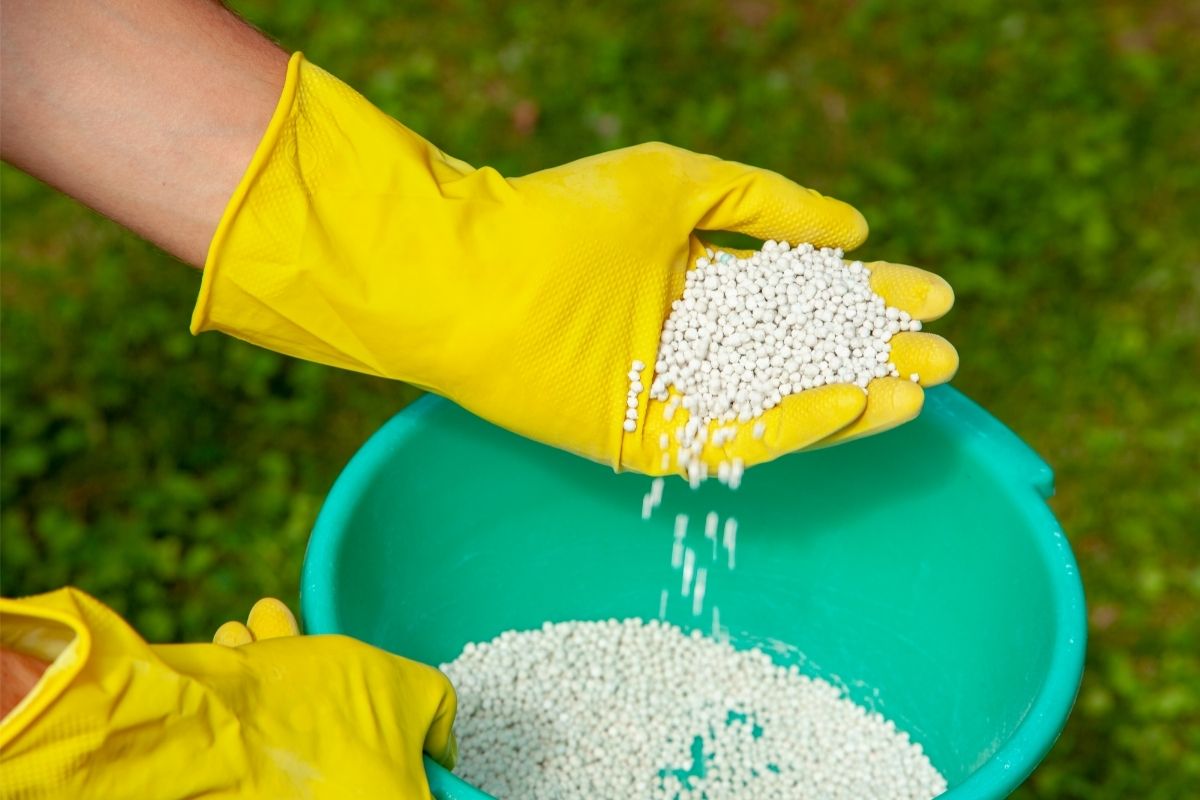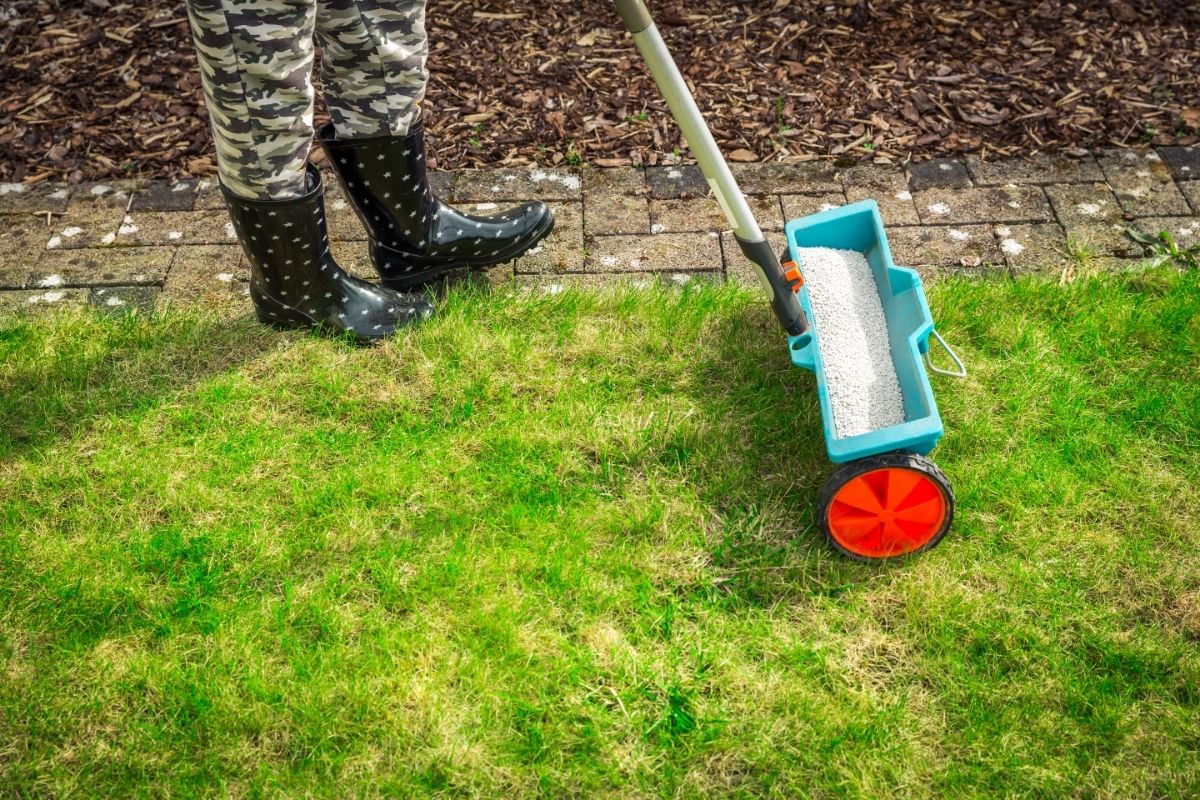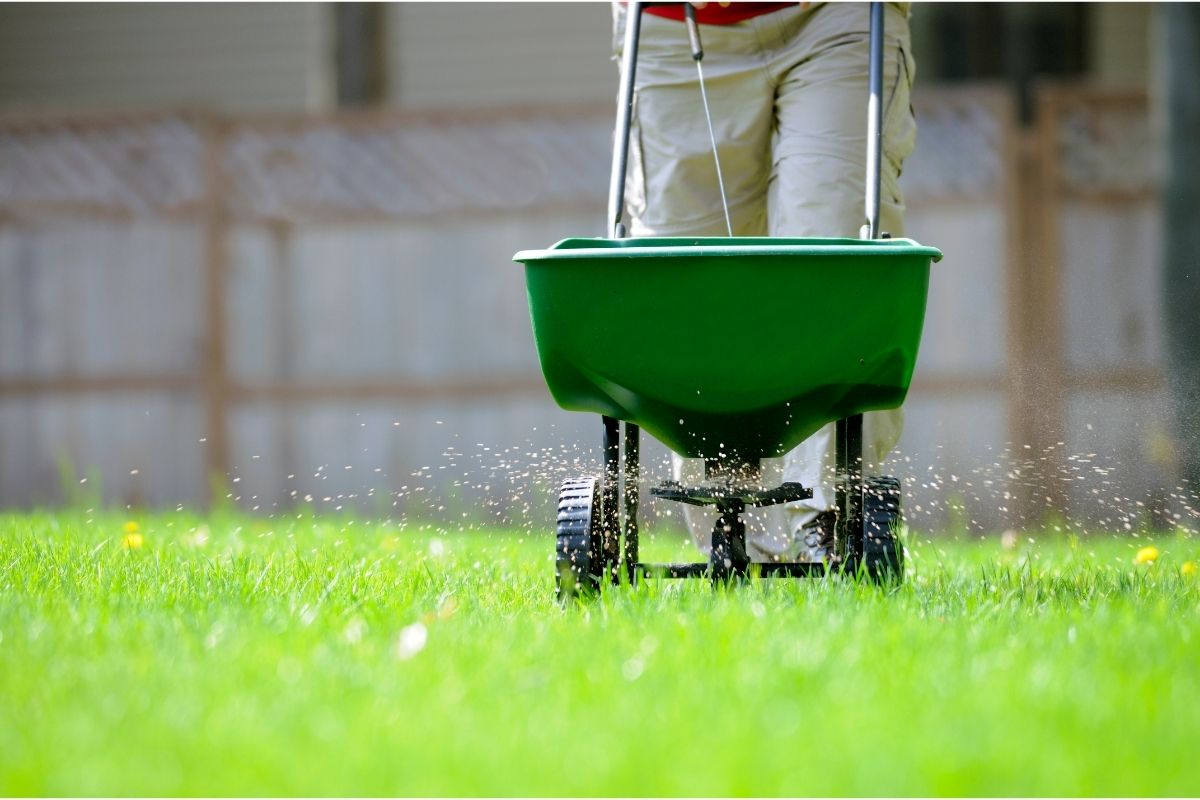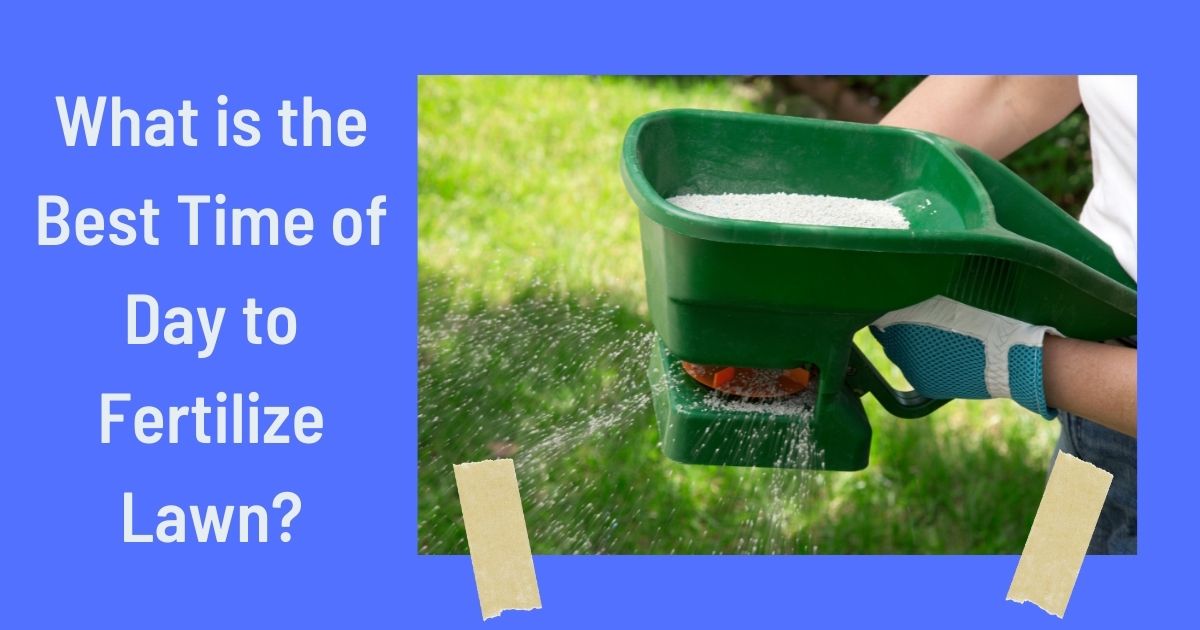What is the best time of day to fertilize lawn? Is it in the evening when there is less traffic or early in the morning when the dew is still on your grass? Remember, efficient absorption of fertilizer requires enough moisture.
Does it mean that you should step out in the rain to fertilize your lawn? Let us explore when to fertilize the lawn.

The Beauty of Lawn Fertilizer
Sometimes, a brand name of lawn fertilizer can intimidate you. It may appear as if the contents are a result of quantum science. However, lawn fertilizer is not as complex as it sounds on the packaging. So, never allow brand names to overwhelm you.
The chemistry behind lawn fertilizers is simple because they contain only three major nutrients: nitrogen, potassium, and phosphorous.
- Nitrogen supports the healthy growth of lawn leaves. In addition, it facilitates the production of chlorophyll for photosynthesis.
- Potassium makes your lawn strong enough to resist diseases and drought. In addition, it enhances the immunity of your yard.
- Phosphorous improves the health of the stems and roots of your lawn.
Every label of lawn fertilizers has a three-number ratio. The numbers represent the ratio of nitrogen (N) to phosphorus (P) and potassium (K). Therefore, it is an N-P-K ratio. The minimum N-P-K ratio for all lawn fertilizers is 3:1:2 or 4:1:2.
If you see such a ratio, it means that the fertilizer contains 3% or 4% nitrogen, 1% phosphorous, and 2% potassium. The remaining percentage represents the trace elements and inert materials. The volume of the fertilizer in a pack determines the level of the ratio percentages. So, a fertilizer pack can even have a 30:10:20 ratio.
Do you know how much fertilizer does your lawn need? If you do not know, 1,000 square feet (92.90 square meters) of the lawn requires one pound (0.45 kilograms) of nitrogen. So, you should know the measurements of your grass when determining the amount of fertilizer to buy.
When sourcing for lawn fertilizer, go for the one with a high percentage of nitrogen to promote the growth of your lawn. The other nutrients should be in smaller quantities.
You can also opt to leave some clippings on your lawn after mowing. Lawn clippings are usually rich in nitrogen. However, do not leave excess clippings because they will make your lawn look untidy.
You should also know that nitrogen grass fertilizers are either fast-release or controlled-release versions. According to expert recommendations, you should use the controlled-release nitrogen fertilizer on your lawn.
If you opt for the fast-release nitrogen fertilizer, your lawn will look green after a short time. The fertilizer is also ideal for cold soils, and it is relatively cheap. However, it may cause your lawn to grow undesirably fast. It can also burn your grass and get lost through the soil or air.
Regarding the controlled-release nitrogen fertilizer, it supports the uniform growth of your lawn. It also does not burn your grass or get lost through the air and soil quickly. However, it is expensive. Also, it does not work for cold soils or bring a green color on your lawn quickly.
After understanding the beauty of lawn fertilizers, you can now explore the best time of day to fertilize grass. So, what is the best time to fertilize lawn?
What is the Best Time of Day to Fertilize Lawn?
Always fertilize your lawn in the morning or early evening. If you fertilize your lawn in the morning, you will have an advantage of the morning dew on the soil and cooler temperatures. So, your grass becomes less susceptible to burning. Also, the nutrients in the fertilizer will get to the roots of your lawn quickly, and the absorption rate will be high.
If you opt to fertilize your lawn in the evening, your grass should be slightly dry for fertilization before nighttime temperatures take over. Dry lawn leaves allow the fertilizer to drop on the soil without sticking on the leaves. If it sticks on the leaves, it can burn your lawn.
When Should You NOT Fertilizer Your Grass
The last thing you may want to see is your lawn drying out. One of the mistakes that you should avoid is to fertilize it incorrectly. The first step to take is to check the weather and temperature conditions. Fertilizing your lawn when the air is too hot can damage your lawn.
Next, quick- or slow-release lawn fertilizer requires watering after its application. If you apply the fertilizer and water in the afternoon when the sun is hot, the soil will lose the moisture that prevents your lawn from burning. So, avoid hot afternoons when fertilizing your lawn.
Fertilizing and watering your lawn late in the evening makes the yard remain wet after the cool night temperatures arrive. Such a condition leaves your lawn vulnerable to a fungal attack.
Our Top Granular Fertilizer Tips
- Never apply granular fertilizer to lawn with damp leaves. Failure to do so can result in a burned yard. Such grasses can have yellow and brown spots. Also, they may have a mottled appearance. The risk increases when you use quick-release synthetic granular fertilizer. Leaving the fertilizer on your lawn can burn the grass completely.
- Apply granular fertilizer on a dry lawn. Such grass should never have dew, irrigation water, rainwater, or any form of dampness. Fog and mist also make your lawn wet. So, watch the weather for any sign of moisture.
- Wait for at least one day after heavy rainfall to fertilize your lawn. The waiting time will allow your lawn to dry off.
- You do not have to be too careful when applying slow-release organic fertilizer on your lawn. However, morning or early evening remains the ideal time to fertilize your lawn.
The Importance of Lawn Fertilizer
If you fertilize your lawn as a general practice, you cannot do it correctly. You need to understand the importance of fertilizer to your yard. Afterward, you will be in a better position to concentrate on applying fertilizer to your grass correctly. The following are some of the reasons why you need lawn fertilizer:
- The application of lawn fertilizer improves the health of your lawn: As a prerequisite of healthy plant life, the soil should have a high nutrient value. Often, soil loses important nutrients through leaching and erosion. So, you have to keep on replacing the lost nutrients. Fertilizers are an ideal option that replenishes and replaces the soil essentials that your lawn requires.
- Fertilizer equates to the sunshine and water that your lawn requires: Fertilizer is a must-to-add element to your lawn. In other words, it is difficult for your lawn to thrive and survive without fertilizer. Also, the richness of soil depends on the amount of nitrogen, phosphorus, and potassium that the ground contains. The elements are food for your lawn.
- Fertilizer is a green solution: You may look at this fact in three ways. First, if you want your lawn to have lush-green color, you should fertilize it. Second, fertilizers are eco-friendly because they always dissipate in the soil. Thirdly, you can reuse your lawn clippings as organic fertilizer. So, using fertilizer on your lawn is an environment-friendly solution.
- Fertilizer is easy to use: You do not require unique expertise to fertilize your lawn. Following instructions and spreading fertilizer evenly are the two requirements you should observe when applying fertilizer on your lawn. So, you do not have to incur any expense of calling for local aid to apply fertilizer on your lawn.
- Fertilizer makes your lawn grow fast: Fertilizer provides your yard with the diet it requires to grow. So, nothing interrupts its growing speed. If you rely on soil alone, you will wait for a long time before your lawn achieves your preferred size.
- Using fertilizer on your lawn is a cost-effective solution: Fertilizer is inexpensive. Also, you will only maintain your lawn after fertilizing it. So, you will not incur high costs when you opt to use fertilizer on your grass.
- Fertilizers reduce pools and patches on your lawn: Fertilizing your lawn helps its roots to absorb more water. So, the soil becomes firm and does not form muddy patches after rainfall. You will never mind rolling on your lawn after a light rainfall because your clothes will not become muddy.
- Fertilizer controls weeds: If healthy turfgrass makes your lawn, you will no longer use weed-killing products. A strong-rooted, lush, and thick lawn chokes out weeds and prevents them from dominating your yard.
- Fertilizer is a pest control solution: If you fertilize your lawn nicely, it can support a healthy microorganism’s ecosystem. So, it will play host to ladybugs, praying mantis, earthworms, and other insects that prey on harmful pests that damage your lawn.
- Fertilizer gives your lawn a better disease resistance: Your lawn requires a high immune system just like humans do. A good diet is a source of strong immunity. When you fertilize your yard, you make it strong enough to fight diseases.
- Fertilizer helps protect your soil: When your soil is loose, it is prone to erosion. Fertilizing your lawn helps it have strong roots that hold the soil together. In return, the ground will support your yard into an unforeseeable future. So, fertilizing your lawn is a long-term investment.

Should You Fertilize Your Lawn Before it Rains?
What is the best time to fertilize lawn: before or after rain? Fertilizing your grass before a rainstorm or heavy rain is a bad idea. The move can result in the washing away of the fertilizer before the roots of your lawn absorb it. So, you will end up wasting money and other resources.
Apply lawn fertilizer when expecting light to moderate rains. Remember, fertilizer requires water to become soluble for the lawn to absorb. Water also breaks down the nutrients that fertilizer contains. After all, all plants require water to grow.
You can also opt to spread fertilizer on your lawn after a rainfall. The move reduces the fertilizer erosion risk. However, you have to wait until the leaves of your yard dry off. So, you have to keep tabs on the weather forecast to ascertain whether there will be another upcoming precipitation.
Also, check whether the sunshine will remain steady after the rainfall. Sunlight is a photosynthesis requirement. So, regular sunshine after rainfall plus other ideal weather conditions will allow fertilizer to have a full effect on your lawn.
When is the Best Season to Apply Lawn Fertilizer?
The spring is the best season to fertilize your lawn. But, should you do it in early or late spring? You should apply fertilizer on your lawn during the late spring. Grass usually develops its roots in the early spring. So, fertilizing it divides its attention between root development and leaf formation. Such a disruption can result in a poor-quality lawn.
How often should you fertilize your lawn? For lawn growers using organic fertilizer, the application of a single turf-building fertilizer in the early fall helps the grass develop strong roots. Hence, there is no need for another fertilizer application in the spring or summer. Rather, one can depend on the lawn clippings mulch to provide the necessary nitrogen requirements to the lawn.
Those using traditional fertilizers can make two or three light applications during each growing year. The applications can occur during the spring, mid-summer, and early fall. The last application should be a turf-builder.
Your region and type of lawn determine the actual fertilizer application on your grass. If you are unsure, contact your local garden center for advice. You can also contact your nearest cooperative extension office for more information on the two factors.
Once you have figured out the right season to fertilize your hay, schedule the fertilization during the short rains. If the rains fail, you have to supply your lawn with a minimum of 0.02 feet (a quarter-inch) of water.
Do you know when to fertilize the lawn in the fall? Always fertilize it in the late fall. However, if you fertilize your lawn in previous late fall (autumn), the slow-release function of the fertilizer will see your grass through the spring season.
Most fertilizer manufacturers advise you to apply fertilizer on your lawn in the early spring. However, you should heed the advice of agronomists and turf specialists who advocate that you should never apply fertilizer to your yard in the early spring.
In the early spring, cool-season grasses start their regeneration. Their roots begin growing and developing energy reserves. Then, in the late spring and before the heat of summer starts, the grass is already thriving. So, fertilize your lawn in the late spring to prepare it for the summer season.
In summer, grass reduces the production of carbohydrates, and it starts utilizing its energy reserves. So, fertilizing your lawn before the summer kicks off helps rebuild its energy reserves. In addition, such grass can tolerate the summer stressors, including drought, diseases, traffic, and heat.
If possible, use a slow-release polymer-coated fertilizer. It can feed your grass for up to 12 weeks.
Regarding the warm-season grasses, they thrive in summer. So, you can fertilize them throughout the summer. However, the cool-season grasses are usually in a survival mode in summer. So, avoid fertilizing your cool-season grass during the mid or late summer. Instead, water it and manage pests until September.
Lawn experts advise you to apply a mild dose of turf-builder fertilizer to your lawn in the early- to mid-fall. During that period, the grass has sufficient active growth time before stagnation. In addition, the application of a turf-builder builds robust root systems to help your grass tolerate the winter season. The application also facilitates the restarting of the growing cycle of your lawn in spring.
When the winter approaches, do not strain to make your lawn look green. Your yard will experience a natural growth slowdown. Also, its leaves will lose their green luster.

Final Thoughts
If you only knew when to water and trim your lawn, now you are aware of the lawn fertilizer schedule. You are also wary of what makes up lawn fertilizer, when to fertilize lawn in fall, and when to fertilize lawns in spring. So, you are now a pro in taking care of your yard.
